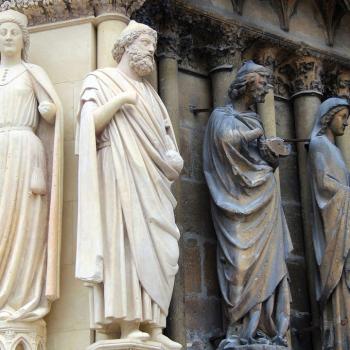Please forgive a brief aside, we'll pick up again on page 129 this week in a second post. Here I want to explore a theory about the theological foundations of Bad Writing and, in particular, Bad Evangelical Writing. As it turns out, I doubt this theory applies to LaHaye and Jenkins, but bear with me.
In the last installment, we followed Buck Williams on an impossible journey across central New Jersey to Manhattan, which seems distorted and immense — like Greenland on a Mercator map. I grew up in central Jersey, in Dunellen, just a few blocks from the commuter train that Buck may or may not have ridden, so the garbled, unreal geography of that section hit, well, close to home.
Gershom Gorenberg had a similar response to the Left Behind series. Gorenberg lives in Jerusalem where he is, among other things, an editor with The Jerusalem Post. He happened to be on vacation in the Galilee, near Tiberias, while reading the third book in LaHaye and Jenkins' series, Nicolae: Rise of the Antichrist.
Gorenberg reads that Buck Williams, "would find who he was looking for in Galilee, which didn't really exist anymore." But it gets worse:
A couple minutes later I'm giggling again: Now Buck has decided to make the three-hour journey to "Tiberius" (sic) by boat — one of the many touring boats that, in the book, ply the Jordan River. Which would be fine if the Jordan were really "deep and wide," as the song goes, but in reality it's a narrow trickle not fit for navigating.
The experience is jarring, like meeting someone who calls you by your name, insists he knows you, remembers you from a high school you didn't attend, a job you never had. I'm reading a book set largely in the country where I live — but not really, because the authors' Israel is a landscape of their imagination, and the characters called "Jews" might as well be named hobbits or warlocks. Israel and Jews are central to Nicolae and the other books of the hugely successful Left Behind series — but the country belongs to the map of a Christian myth; the people speak lines from a script foreign to flesh-and-blood Jews.
That's from Gorenberg's fascinating book The End of Days: Fundamentalism and the Struggle for the Temple Mount. (Gorenberg has a lot more to say about LB and the apocalyptic obsession of folks like L&J, so we'll be getting back to him and End of Days a bit more down the line.)
Gorenberg's take on the mythic "landscape of the imagination" helps to explain some of the warped geography of LB. Places like Jerusalem and Manhattan are meaningful to L&J only insofar as they represent forces at work in their predetermined End Times puppet show, so it doesn't matter if the mythic Israel or the mythic New York bears any resemblance to its real-world counterpart.
But this doesn't explain L&J's strange habit of bogging down in places like Waukegan or Easton, neither of which plays a role in pseudo-biblical prophecy. (Neither does New York, of course, but that doesn't stop L&J from treating it as a stand-in for Rome or Babylon or Ninevah.)
Much of this stuff is simply Bad Writing. Sometimes it can be accidentally entertaining in a Plan 9 From Outer Space way, but usually, like most Bad Writing, it's just boring.
In the case of such passages, the dark matter that composes the unreadable bulk of the series, it is not the content that bears theological or political significance, but the simple fact that it exists. This craptacular prose was written by Christian writers, approved by Christian editors, printed and bound by a Christian publishing house. This is shameful.
Christianity has traditionally held a high view of vocation. Christians believe that the artisan, tradesman or professional has the opportunity and obligation to glorify God by striving for excellence at his or her craft. The primary duty of a Christian plumber, in other words, is to be a good plumber. And the primary duty of a Christian artist is to be a good artist. This is true whatever one's calling: doctor, lawyer, Indian chief, online copyeditor.
This teaching goes way back — at least to Aristotle (as rechristened and adopted by Aquinas). But a competing understanding has arisen in American evangelical Christianity. From this perspective, the primary duty of every Christian regardless of vocation is evangelism. Everything else is just a means to this end.
According to this view, then, the primary duty of the Christian plumber is to spread the gospel. After all, what doth it profit a customer if a Christian plumber fixes their sink, but leaves their immortal soul in disrepair? This doesn't necessarily mean that such an evangelist-plumber will be incompetent at his trade. It's possible he could still be an excellent, if somewhat annoying, plumber. But excellence — or even basic competence — is no longer his priority. And he certainly does not believe, as craftsmen of the Aquinastotelian tradition did, that incompetence is a sin.
In this view vocation is unimportant. The standards of your craft become secondary to your duties as a member of the Congregation for the Propagation of the Faith. This is particularly problematic for the Christian artist, whose art is now made a means to an end, i.e., propaganda.
This is one possible explanation for the utter inattention to craft of Jerry B. Jenkins, evangelist-novelist. It's a rather charitable view, ascribing Jenkins' incompetence as a novelist to a well-intentioned, but misguided, understanding of vocation and Christian duty.
I do think this devaluation of vocation helps to explain a lot of bad "Christian" art, including the dismally derivative world of "contemporary Christian music." But I'm not sure LaHaye and Jenkins really deserve such charitable consideration. As I've argued elsewhere, the presumption of charity ends when you cash the really big check.
Tim & Jerry are laughing all the way to the bank. They're reaping millions from these slapdash books without putting in the effort that even a semi-competent novel would require, the effort that their readers deserve. (Jenkins has said that each of the books in the series took him about 28 days to write.)
This is a form of stealing. The priority of evangelism provides a nice spiritual cover-story, but LaHaye and Jenkins are simple con-men and thieves, preying on their brothers and sisters in the church.
















